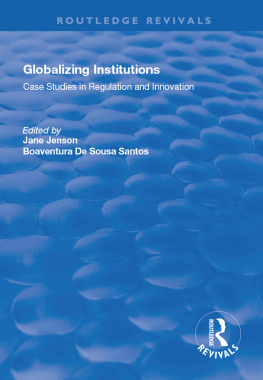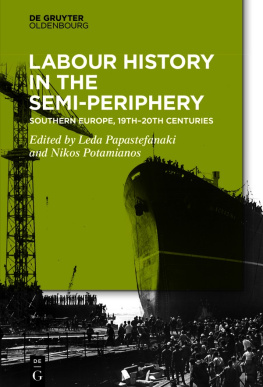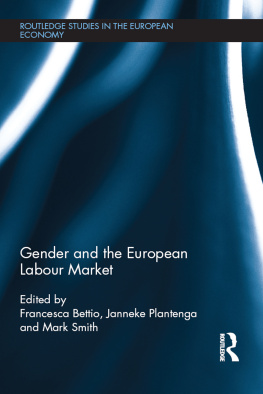First published 2000 by Ashgate Publishing
Reissued 2018 by Routledge
2 Park Square, Milton Park, Abingdon, Oxon OX14 4RN
711 Third Avenue, New York, NY 10017, USA
Routledge is an imprint of the Taylor & Francis Group, an informa business
Copyright Jane Jenson, Jacqueline Laufer and Margaret Maruani 2000
Originally published as Les nouvelles frontires de lingalit, edited by Margaret Maruani 1998 Editions La Dcouverte & Syros.
All rights reserved. No part of this book may be reprinted or reproduced or utilised in any form or by any electronic, mechanical, or other means, now known or hereafter invented, including photocopying and recording, or in any information storage or retrieval system, without permission in writing from the publishers.
Notice:
Product or corporate names may be trademarks or registered trademarks, and are used only for identification and explanation without intent to infringe.
Publishers Note
The publisher has gone to great lengths to ensure the quality of this reprint but points out that some imperfections in the original copies may be apparent.
Disclaimer
The publisher has made every effort to trace copyright holders and welcomes correspondence from those they have been unable to contact.
A Library of Congress record exists under LC control number: 99085927
ISBN 13: 978-1-138-70418-3 (hbk)
ISBN 13: 978-1-138-70417-6 (pbk)
ISBN 13: 978-1-315-20281-5 (ebk)
Philippe ALONZO Sociologist, Universit de Nantes, France.
Christian BAUDELOT Sociologist, cole normale suprieure de Paris, France.
Maria-Carmen BELLONI Sociologist, Universit de Turino, Italy.
Jean-Yves BOULIN Sociologist, IRIS Travail et Socit, Universit de Paris-Dauphine, France.
Marlaine CACOUAULT Sociologist, Universit de Paris V, France.
Anne-Marie DAUNE-RICHARD Sociologist, LEST-CNRS, Aix-en-Provence, France.
Annick DURAND-DELVIGNE Psychologist, Universit de Lille-III, France.
Marie DURU-BELLAT Sociologist, Universit de Bourgogne, France.
Colette FAGAN Sociologist, University of Manchester, United Kingdom.
Genevive FRAISSE Philosopher, European Deputy, France.
Delphine GARDEY Historian, Cit des sciences et de lindustrie, CRHST, France.
Franoise GASPARD Sociologist, CADIS-EHESS, France.
Annie GAUVIN Economist, Dlgation Gnrale lemploi et la formation professionnelle (Ministre de lEmploi et de la Solidarit), France.
Ariane HEGEWISCH Economist, Cranfield School of Management, United Kingdom.
Helena HIRATA Sociologist, GEDISST-CNRS, France.
Jane JENSON Political Scientist, Universit de Montral, Canada.
Annie JUNTER-LOISEAU Jurist, Universit de Rennes, France.
Danile KERGOAT Sociologist, GEDISST-CNRS, France.
Michel LALLEMENT Sociologist, MATISSE, Universit de Paris-I, France.
Marie-Thrse LANQUETIN Jurist, Universit de Paris-X, Nanterre, France.
Jacqueline LAUFER Sociologist, HEC, School of Management, France.
Jane LEWIS Historian and Sociologist, University of Nottingham, United Kingdom.
Olivier LIAROUTZOS Sociologist, CEREQ, Marseille, France.
Catherine MARRY Sociologist, LASMAS-CNRS, France.
Margaret MARUANI Sociologist, CSU-CNRS, France.
Danile MEULDERS Economist, Universit Libre de Bruxelles, Belgium.
Jacqueline OREILLY Sociologist, WZB, Berlin, Germany.
Chantal ROGERAT Sociologist, GEDISST-CNRS, France.
Jill RUBERY Economist, Manchester School of Management, UMIST, United Kingdom.
Sylvie SCHWEITZER Historian, Universit de Lyon-II, France.
Rachel SILVERA Economist, MATISSE, Universit de Paris-I, France.
Teresa TORNS Sociologist, Universitat autonoma de Barcelona, Spain.
Sylvia WALBY Sociologist, University of Leeds, United Kingdom.










